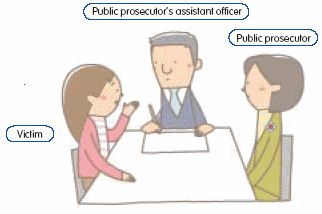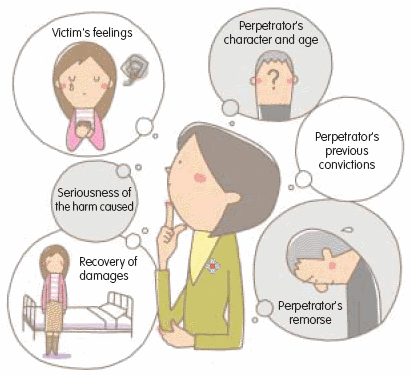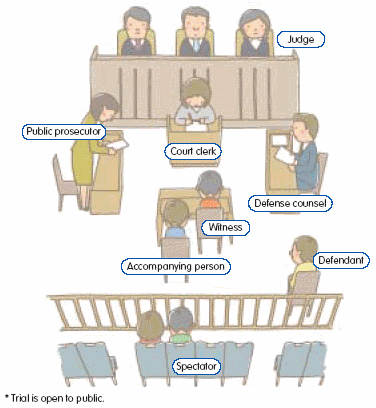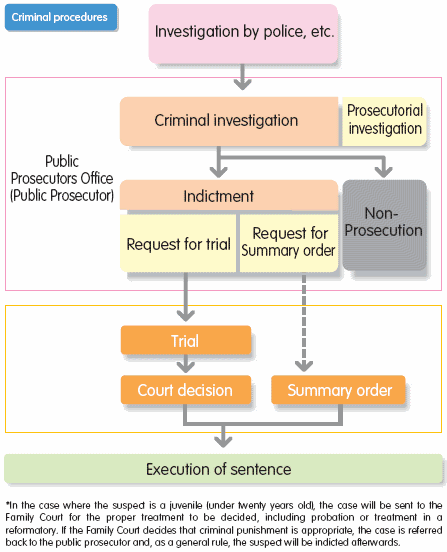


There are 4 levels of Public Prosecutors Offices corresponding to each level of the court: the Supreme Public Prosecutors Office (Tokyo), High Public Prosecutors Offices (Tokyo, Osaka, Nagoya, Hiroshima, Fukuoka, Sendai, Sapporo and Takamatsu), District Public Prosecutors Offices (at prefectural capitals, Hakodate, Asahikawa and Kushiro) and Local Public Prosecutors Offices (at municipalities throughout Japan).
Each public prosecutor belongs to one of the Public Prosecutors Offices above as a public prosecutor or an assistant public prosecutor. Public prosecutors are generally appointed from those who have passed the National Bar Examination and finished legal apprenticeships in the same way as judges and private practicing attorneys. Assistant public prosecutors are appointed from public prosecutor’s assistant officers and other qualified officials who have gone through selection process at committees held in the Ministry of Justice. In addition, public prosecutor’s assistant officers work at Public Prosecutors Offices to assist prosecutors.

When a crime takes place, usually the police will carry out an investigation, arrest the perpetrator, and then refer the case to the Public Prosecutors Office. The Public Prosecutors Office takes statements from the victim and witnesses, interrogates the suspect (i.e., the person who is suspected of committing the crime and is the subject of the investigation) and, after completing investigation, makes the decision whether to prosecute or not. In a case of juvenile crime, the Public Prosecutors Office refers the case to the Family Courts along with a recommendation for treatment.

Further, the Public Prosecutors Office, when it deems necessary, initiates its own criminal investigation and arrests suspects (i.e., Prosecutorial investigations without referral from the Police).

After the investigation is completed, a public prosecutor makes a decision on whether to prosecute or not. Prosecution by the public prosecutor includes request for trial, where the public trial will be held in a court room, and request for summary order, where the decision and sentencing (for example, a fine) are rendered through the examination of documentary evidence without a public trial.
Reasons for non-prosecution include “insufficient suspicion,” where the evidence is insufficient to prove an offense, “suspension of prosecution,” where an offense is provable but prosecution is deemed unnecessary in light of the character, age, or circumstances of the perpetrator, the seriousness and nature of the offense, and “criminal insanity,” where the perpetrator’s mental state impedes their ability to distinguish between right and wrong and they are judged to be not criminally responsible for their actions.


Public prosecutor will attend the trial to prove that the defendant (person who has been indicted) has committed the offense by requesting and conducting examination of evidence including witness testimonies.
The public prosecutor, after concluding the examination of evidence, will make a recommendation as to the degree of punishment. After considering the opinions of the public prosecutor and the defense counsel, the court will render its sentencing judgment. The sentence will include imprisonment with work and imprisonment without work. Execution of the sentence may be suspended, depending on the circumstances of the case.
If the public prosecutor believes the court made a wrong judgment about the facts or the sentencing, the public prosecutor may appeal the case.


The public prosecutor supervises and directs the enforcement of the court decision (imprisonment, fine, etc.)
